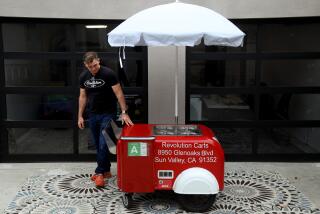Pepsico Tests Food Carts at Moscow Subway Stops : Restaurants: Pushcarts featuring Taco Bell food are aimed at Muscovites’ insatiable fast food appetite.
- Share via
MOSCOW — Will burritos replace borscht as the lunch of a new generation of Russians?
Pepsico, the Purchase, N.Y.-based restaurant, food and beverage concern, is betting that many of the 9 million Muscovites who take the subway every day will be enticed by the restaurants-on-wheels concept it unveiled last week at Moscow’s Culture Park subway stop.
The Metro Express, a gleaming red, white and blue pushcart with work stations for grilling frankfurters, heating food and dispensing soda, premiered with a simple menu: burritos from Pepsi subsidiary Taco Bell, Pepsi Cola and imported franks.
Pepsi said it will open 17 Metro Express carts at the entrance to eight Moscow subway stations and plans to put carts at all 149 stops of the metro if the initial test carts are successful. Pepsi’s contract gives it the exclusive right “for several decades” to sell food in the capital’s subway.
As the success of McDonald’s here shows, Russians have an insatiable craving for American fast food. McDonald’s--whose golden arches went up over Moscow three years ago--has inspired other competitors to jump into the Russian market.
“Metro Express serves the needs of consumers in the most convenient place,” said F. David Jones, president of Pepsico’s Eastern Europe/Central Asia Division. “This has the potential to be the largest food distribution channel--not just in Moscow, not just in Russia, but it will be the largest food channel in the world.”
For Irvine-based Taco Bell, Metro Express--its first entry into the Russian market--is a relatively inexpensive way to see if Russians will develop enough of a taste for little-known Mexican food to justify opening restaurants.
“If this project is as successful as we think it will be, it will be the forerunner of additional Taco Bells in Moscow and around Russia,” said Bob Jenkins, Taco Bell’s director of international field services.
Pepsi’s two Pizza Hut restaurants in Moscow are already drawing crowds. (The pushcarts will eventually feature pizza too.)
Taco Bell already operates nearly 100 restaurants in 16 nations internationally, with two more Eastern European restaurants scheduled to open in Warsaw this summer. Carts like Metro Express can serve about half as many people as a restaurant every day but cost only 10% as much to run.
The burritos served at Metro Express were designed especially for Moscow, Jenkins said, using cheese sauce instead of fresh grated cheese to make them less expensive and easier to prepare. Although all ingredients are imported, Jenkins said Taco Bell’s long-term goal is to buy all its products locally to help keep costs down.
Prices at Metro Express are far lower than in the United States, with a chili and cheese burrito costing 45 cents and a Pepsi going for 9 cents.
Although the average Russian salary is only about $25 a month, Jones expects that each cart will serve at least 1,000 hungry Muscovites a day. “There is a significant portion of people here who do get well paid,” he said.
Pepsi’s potential market for the fast-food venture may expand. Officials of the St. Petersburg metro system are observing the Moscow experiment, as are representatives of several other former Soviet cities with subways.
Pepsico has been a leader in doing business with the Soviet Union and its successor states, having opened its first Soviet bottling plant in 1974.
The key to its longevity in this tough market may be its ability to find creative ways to make deals. Last year, for example, Pepsico signed a $1-billion agreement in Ukraine to open 100 Pizza Huts and accept ships in exchange. The tankers, built in Ukraine with money made from selling pizza, will be resold in the West for more lucrative foreign currencies.
More to Read
Inside the business of entertainment
The Wide Shot brings you news, analysis and insights on everything from streaming wars to production — and what it all means for the future.
You may occasionally receive promotional content from the Los Angeles Times.










